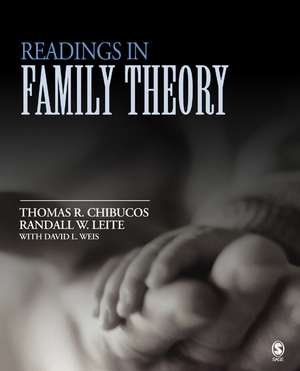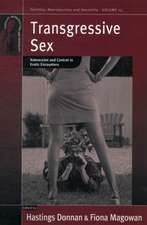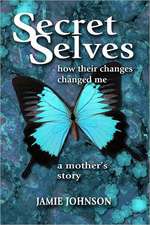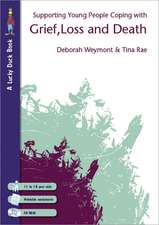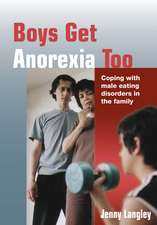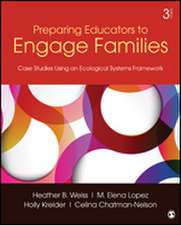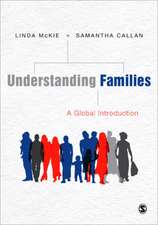Readings in Family Theory
Editat de Thomas R. Chibucos, Randall W. Leite, David L. Weisen Limba Engleză Paperback – 17 ian 2005
Key Features
Volume editors provide an introduction to the reader and discuss what theory is and why it is important
Nine theoretical perspectives are examined-family life course, life-span development, social learning, social exchange, social conflict, feminist, symbolic interactionist, family systems, and ecological
Chapters include a brief description of the readings, issues for consideration, and a list of additional readings for further research
The concluding chapter provides an overview of developments in family theory and thoughts on future directions
Readings in Family Theory provides undergraduate and graduate students with an excellent introduction to family theory. It can be used as a stand-alone text or as a companion to any other family theory texts.
Preț: 931.30 lei
Preț vechi: 1135.73 lei
-18% Nou
Puncte Express: 1397
Preț estimativ în valută:
178.22€ • 186.30$ • 150.60£
178.22€ • 186.30$ • 150.60£
Carte tipărită la comandă
Livrare economică 07-21 martie
Preluare comenzi: 021 569.72.76
Specificații
ISBN-13: 9781412905701
ISBN-10: 1412905702
Pagini: 400
Dimensiuni: 187 x 232 x 21 mm
Greutate: 0.66 kg
Ediția:New.
Editura: SAGE Publications
Colecția Sage Publications, Inc
Locul publicării:Thousand Oaks, United States
ISBN-10: 1412905702
Pagini: 400
Dimensiuni: 187 x 232 x 21 mm
Greutate: 0.66 kg
Ediția:New.
Editura: SAGE Publications
Colecția Sage Publications, Inc
Locul publicării:Thousand Oaks, United States
Cuprins
Preface
Acknowledgments
1. Theory: What It Is and Why It Is Important
Notable Differences Between Everyday Life and Family Research
Example of Theory Building and the Research Process
Defining Family?
Issues for Your Consideration
Further Reading
2. Family Life Course Theory
The Readings
Issues for Your Consideration
Further Reading
Involuntary celibacy: A life course analysis - Donnelly, Burgess, Anderson, Davis, & Dillard, 2001
Life course transitions, the generational stake, and grandparent-grandchild relationships - Crosnoe & Elder, 2002
3. Life-Span Developmental Theory
The Readings
Issues for Your Consideration
Further Reading
The influence of context, timing, and duration of riskpassage from childhood to midadulthood experiences for the - Schoon, Bynner, Joshi, Parsons, Wiggins, & Sacker (2002)
Marital status continuity and change among young and midlife adults: Longitudinal effects on psychological well-being - Marks & Lambert, 1998
4. Social Learning Theory
The Readings
Issues for Your Consideration
Further Reading
A social learning theory model of marital violence - Mihalic & Elliott, 1997
Intergenerational transmission of constructive parenting - Chen & Kaplan, 2001
5. Social Exchange Theory
The Readings
Issues for Your Consideration
Further Reading
Costs and rewards of children: The effects of becoming a parent on adults' lives - Nomaguchi & Milkie, 2003
Equity and social exchange in dating couples: Associations with satisfaction, commitment, and stability - Sprecher, 2001
6. Social Conflict Theory
The Readings
Issues for Your Consideration
Further Reading
A conflict theory of family violence - Witt, 1989
Status and income as gendered resources: The case of marital power - Tichenor, 1999
7. Feminist Theory
The Readings
Issues for Your Consideration
Further Reading
Feminist visions for transforming families: Desire and now equality then and - Allen, 2001
Do gender roles matter? Family formulation and dissolution among traditional and egalitarian men and women - Kaufman, 2000
8. Symbolic Interactionism
The Readings
Issues for Your Consideration
Further Reading
The symbolic origins of conflict in divorce - Hopper, 2001
"They think you ain't much of nothing": Social construction of the welfare mother "They think you ain't nothing": The social construction of the welfare - Seccombe & Walters, 1998
9. Family Systems Theory
The Readings
Issues for Your Consideration
Further Reading
Relations between identity formation and family characteristics of adults - Mullis, Brailsford, & Mullis, 2003
Structural family therapy - Vetere, 2001
10. Ecological Theory
The Readings
Issues for Your Consideration
Further Reading
Balancing employment and fatherhood: A systems perspective - Berry & Rao, 1997
The social ecology of marriage and other intimate unions Getting dinosaurs to dance: Community collaborations of theory - Perkins, Ferrari, Covey, & Keith, 1996
11. Discussion and Conclusions
Overview of Developments in Family Theory
Thoughts on Future Directions
References
Index
About the Editors
Acknowledgments
1. Theory: What It Is and Why It Is Important
Notable Differences Between Everyday Life and Family Research
Example of Theory Building and the Research Process
Defining Family?
Issues for Your Consideration
Further Reading
2. Family Life Course Theory
The Readings
Issues for Your Consideration
Further Reading
Involuntary celibacy: A life course analysis - Donnelly, Burgess, Anderson, Davis, & Dillard, 2001
Life course transitions, the generational stake, and grandparent-grandchild relationships - Crosnoe & Elder, 2002
3. Life-Span Developmental Theory
The Readings
Issues for Your Consideration
Further Reading
The influence of context, timing, and duration of riskpassage from childhood to midadulthood experiences for the - Schoon, Bynner, Joshi, Parsons, Wiggins, & Sacker (2002)
Marital status continuity and change among young and midlife adults: Longitudinal effects on psychological well-being - Marks & Lambert, 1998
4. Social Learning Theory
The Readings
Issues for Your Consideration
Further Reading
A social learning theory model of marital violence - Mihalic & Elliott, 1997
Intergenerational transmission of constructive parenting - Chen & Kaplan, 2001
5. Social Exchange Theory
The Readings
Issues for Your Consideration
Further Reading
Costs and rewards of children: The effects of becoming a parent on adults' lives - Nomaguchi & Milkie, 2003
Equity and social exchange in dating couples: Associations with satisfaction, commitment, and stability - Sprecher, 2001
6. Social Conflict Theory
The Readings
Issues for Your Consideration
Further Reading
A conflict theory of family violence - Witt, 1989
Status and income as gendered resources: The case of marital power - Tichenor, 1999
7. Feminist Theory
The Readings
Issues for Your Consideration
Further Reading
Feminist visions for transforming families: Desire and now equality then and - Allen, 2001
Do gender roles matter? Family formulation and dissolution among traditional and egalitarian men and women - Kaufman, 2000
8. Symbolic Interactionism
The Readings
Issues for Your Consideration
Further Reading
The symbolic origins of conflict in divorce - Hopper, 2001
"They think you ain't much of nothing": Social construction of the welfare mother "They think you ain't nothing": The social construction of the welfare - Seccombe & Walters, 1998
9. Family Systems Theory
The Readings
Issues for Your Consideration
Further Reading
Relations between identity formation and family characteristics of adults - Mullis, Brailsford, & Mullis, 2003
Structural family therapy - Vetere, 2001
10. Ecological Theory
The Readings
Issues for Your Consideration
Further Reading
Balancing employment and fatherhood: A systems perspective - Berry & Rao, 1997
The social ecology of marriage and other intimate unions Getting dinosaurs to dance: Community collaborations of theory - Perkins, Ferrari, Covey, & Keith, 1996
11. Discussion and Conclusions
Overview of Developments in Family Theory
Thoughts on Future Directions
References
Index
About the Editors
Descriere
Readings in Family Theory is an anthology of classic and contemporary articles that provides a context for student learning by demonstrating how theory fits into the overall process of scientific research on families. The book provokes student interest in theory by providing examples of the scholarly application of family theory to compare how people use similar processes in everyday life. Using this contextual orientation, the selected readings examine nine prevalent theoretical perspectives from both family and human development sciences.
